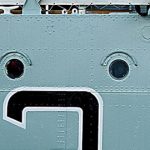Hands to Action Stations Royal Navy
Hands to Action Stations Assume NBCD State 1 Condition Zulu
“Hands to Action Stations! Assume NBCD State 1 Condition Zulu” is a significant command broadcasted throughout a warship when it is preparing to engage with the enemy. This state of readiness indicates a high level of preparedness, with NBCD State 1 Condition Zulu Alpha being the highest state, involving the possibility of a chemical or nuclear attack. The crew members respond promptly to the alarm, executing their assigned tasks with precision and efficiency. These protocols highlight the Royal Navy’s commitment to safeguarding the ship and its personnel in the face of potential threats, emphasising the gravity of the situation and the importance of being fully prepared for any hostile encounters.
Hands to Action Stations Ringtone
This Royal Navy ringtone, available for download on this very website, adds a touch of naval flair to your everyday phone calls. Imagine the sheer surprise and amusement as your phone bursts into action with the unmistakable sound of the Royal Navy’s command, urging all hands to their stations. And if you’re feeling mischievous, why not assign this lively ringtone specifically for those moments when your beloved mother-in-law decides to grace you with her call? It’s the perfect blend of practicality and playful banter, guaranteed to bring a smile to your face and a chuckle to those around you. So go ahead, add a dash of naval charm to your ringtone collection and let the hilarity ensue when your phone rings with the iconic “Hands to Action Stations” sound!
You can download a copy of the Hands to Action Stations Assume NBCD State 1 Condition Zulu. You may also want to take a look at this playlist on YouTube: Royal Navy Pipes and Broadcasts. Where you will find many pipes and broadcast that you would have heard in the 70s, 80s and early 90s. If there is a certain pipe that you would like to hear, then please leave a comment on one of our videos and we will see what we can do to get you that pipe. I can confirm that we are at the moment trying to get together a collection of Bosun’s Pipes and Calls, but finding an old Royal Navy Sailor that plays them well is proving a little difficult.
The Main Broadcast Alarm Sound
The three harsh blast of the main broadcast alarm is not just used for sounding action stations. The actual alarm itself is to alert the crew of some form of danger that could be detrimental to the integrity of the RN warship. When the alarm is sounded, it will always be followed by a call to action. If there is a fire onboard a Royal Navy warship, you will hear three blast from the alarm followed by; Fire, fire fire, fire in (location) attack party muster at the scene of the fire, support party muster at (location). Another use of the main broadcast alarm would be used if there is a flood within a certain compartment.
Old Royal Navy Whoop Whoop Alarm
If you are looking for a more fun and friendly type of alarm, then why not have a listen to the Royal Navy Whoop Whoop Alarm. On this page you will find a video and links on how to download this alarm for your mobile phone ringtone.
What are the three state of readiness in the royal navy?
- NBCD State 3: This represents a normal state of readiness, where there are no immediate threats or specific actions required.
- NBCD State 2: This signifies an increased state of readiness, indicating a potential threat or the need for heightened preparedness.
- NBCD State 1: This is the highest state of readiness, reserved for imminent or ongoing hazardous situations, such as possible attack, the possibility of a chemical or nuclear attack.
#RoyalNavy #MTVzzz
| Classic Naval Films | Buy Here | |
|---|---|---|
 | Sailor Documentary by the BBC. Follow the daily routine of sailors living onboard HMS Ark Royal. This documentary was filmed in the mid 70's. I personally consider this to be an excellent documentary, filled with excitement and great comedy! | |
 | "Yangtse Incident" is a British war film released in 1957, directed by Michael Anderson. Based on a true story, the film recounts the events of the Yangtze Incident in 1949 during the Chinese Civil War. The story follows the crew of HMS Amethyst, a British frigate, as it becomes trapped in hostile Chinese territory on the Yangtze River. The film explores the crew's resilience and resourcefulness as they face adversity and attempt to navigate treacherous diplomatic and military challenges. "Yangtse Incident" is recognised for its gripping portrayal of a real-life international crisis, capturing the tension and bravery of the British sailors involved. | |
 | "In Which We Serve" is a British war film released in 1942, co-directed by Noël Coward and David Lean. This classic film revolves around the crew of the fictional HMS Torrin during World War II. Coward, who also stars in the film, plays the role of Captain Kinross. The narrative unfolds through flashbacks, detailing the ship's history and the experiences of its crew, emphasising the bonds forged in the face of adversity. "In Which We Serve" is celebrated for its patriotic spirit, realistic portrayal of wartime challenges, and the poignant exploration of camaraderie and sacrifice on the home front and at sea. | |
 | Certainly! "Das Boot" is a German war film released in 1981, directed by Wolfgang Petersen. Based on Lothar-Günther Buchheim's novel, the film offers a claustrophobic and intense portrayal of life aboard a German U-boat during World War II. Set in the hostile waters of the Atlantic, it follows the crew's struggles with fatigue, fear, and the constant threat of Allied forces. Petersen's masterful direction immerses the audience in the tension and realism of submarine warfare. "Das Boot" is renowned for its gripping narrative, exceptional performances, and its ability to capture the psychological toll of living on the front lines beneath the ocean's surface. | |
 | "The Cruel Sea" (1953) is a gripping British war film directed by Charles Frend, adapted from Nicholas Monsarrat's novel. Set during WWII, it follows the crew of HMS Compass Rose, a Royal Navy corvette battling German U-boats in the perilous North Atlantic. The film powerfully depicts the psychological toll of naval warfare, delivering a realistic portrayal of the challenges and sacrifices faced by those navigating the treacherous waters of the Battle of the Atlantic. | |
 | Pusser's Rum - whilst you are watching your film, why not enjoy a lovely a tot of rum. "Splice the Mainbrace" |








Pingback:Royal Navy Pipes and Main Broadcasts Alarms